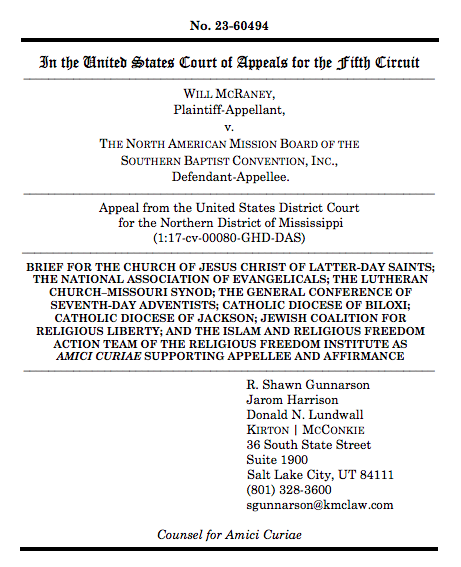Summary of facts: An ordained minister who served as a director in the North American Mission Board (NAMB) of the Southern Baptist Convention disagreed with others in the institution over the best way to achieve its religious objectives. As a result, the minister was fired from his role as director. He then sued for defamation and tortious interference with his employment. The federal district court dismissed the lawsuit under the ecclesiastical abstention doctrine, which holds that a court may not entertain a case that would necessarily entangle it in matters of religious doctrine. The plaintiff appealed to the US Court of Appeals for the Fifth Circuit, which held that the district court should have allowed the parties to conduct discovery on the question of whether the ecclesiastical abstention doctrine applied. The NAMB asked the Supreme Court to hear the case (see RFI’s brief here) but the high court declined. After discovery, the lower court again held that the minister’s case was barred by the ecclesiastical abstention doctrine. The minister again appealed to the Fifth Circuit.
RFI’s position: The Court of Appeals should affirm the lower court’s ruling. Preserving the First Amendment’s barrier dividing the powers of church and state secures the autonomy of diverse religious organizations to develop their own doctrine, form their own communities, and run their own institutions without governmental interference. That barrier is crucial when a religious organization chooses to remove a minister. Unless that choice can be made without judicial oversight, churches and faith communities will lose a vital aspect of the religious freedom guaranteed by the Constitution.
Read the amicus brief here.
THE RFI BLOG

Does Southeast Asia Lead the World in Human Flourishing?

RFI Leads Training Session on Religious Freedom Law and Policy for U.S. Army War College

Oral Argument in Charter School Case Highlights Unconstitutional Motives Behind OK Attorney General’s Establishment Clause Claim

Largest Longitudinal Study of Human Flourishing Ever Shows Religion’s Importance

Keys To Human Flourishing: Faith And Relationships Outweigh Wealth
CORNERSTONE FORUM

Reaffirming Religious Freedom: Bridging U.S. Advocacy and Iraq’s Constitutional Framework

Political Polarization, Same-Sex Marriage and Religious Liberty

Bridging the Gap Between International Efforts and Local Realities: Advancing Religious Freedom in the MENA Region

Challenges to Religious Freedom in Iraq and the Critical Need for Action


